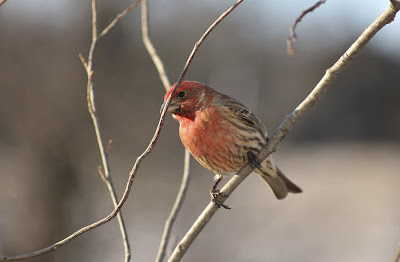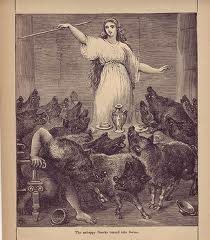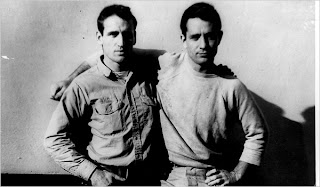In this class blog, the members of World Literature to 1500 will share information and discussions over the course of the sixteen-week class.
Tuesday, April 24, 2012
The World of Dante
This website is interesting to explore. It not only contains a gallery, with illustrations inspired by Dante's Divine Comedy, but also maps Hell, Purgatory, and Paradise, and music mentioned in Purgatorio and Paradiso. It also includes a timeline that is useful for keeping up with Dr. Clemente's references to the different people Dante refers to. The sections (Inferno, Purgatorio, and Paradiso) also include the three books in total (Italian on the left, English on the right, as in our books). It also includes additional information on the three books, such as the terms used in each, as well as an interactive map of Hell under the Inferno section. While this information does not go into as much depth as the notes in the back of our books, I find some of it useful in conjunction with our text.
Friday, April 20, 2012
Little Nicky: Hitler's Fate
This movie gets alot of its ideas from Dante and I can't help but always think of this scene when we are discussing how the punishment fits the crime. I know it is a little inappropriate but I find it hilarious. There are several other comedic references to the punishment the sinners in this movie.
Wednesday, April 18, 2012
Images from Dante
I am reading this incredibly fast. I am fascinated! This image is from Canto 32. It is the Ninth Circle, first ring. I love these images. There are more at this website which focuses on the work of Gustave Dore'.
Tuesday, April 10, 2012
The Art of Courtly Love
This website talks about not only the history of courtly love, but also the troubadours, and the "rules" of courtly love. The Art of Courtly Love is on Google Books, so you can view almost all of it there. These are the rules that were applied in Eleanor of Aquitaine's time, and were considered when Chretien de Troyes was writing his tales of Arthurian legend.
Tuesday, March 20, 2012
Table paralleling Greek and Roman gods/goddesses
This is a little late for Virgil and for Homer, but I thought it was useful. I should have posted it sooner. Hope you enjoy!
Greek/Roman god Table: http://www.katehovey.com/chart.html
Greek/Roman god Table: http://www.katehovey.com/chart.html
Tuesday, February 28, 2012
"Dido and Aeneas" and the descent to the underworld
Henry Purcell created the opera "Dido and Aeneas," a retelling of the tragic love story we read in the Aeneid. This website explains a lot more about the opera, including that it is witches instead of Mercury that reminds Aeneas of his duty to found Rome.
One of the most famous pieces of that opera is what is known as "Dido's Lament" or the aria actually titled "When I am Laid in Earth." Here is a version sung by Hayley Westenra, a more modern artist. A link to the lyrics are in the description beneath the video.
This link talks a lot more about the common theme of the descent to the underworld in myths. If you don't have the time or inclination to read all of it, here's the gist: the descent to Hades or hell was a step on the journey that led the hero ultimately to enlightenment. The author also talks about the significance of the downward descent, literal in the stories we have been reading, where the Underworld is actually under the crust of the earth. Although hell has always been thought of as at least being partially a torture chamber, the Hades of the Greeks also holds the Elysian fields, their equivalent of Christianity's heaven. The author references several other 'descent' myths, including Gilgamesh and the myth of Orpheus. (This link takes you to another site with two versions of the Orpheus myth.) The author of "The Descent into Hades" discusses the idea of the descent being literally versus otherwise and how it may or may not be the equivalent of a temporary death for the hero. Despite the frequency that trips to the Underworld are mentioned, it was not an easy thing. The author lists a number of rituals that the hero would have to complete in preparation for the journey. In the end, the author states, "The true significance of the descent into Hades is not to be measured by mundane results. These are but stepping-stones on the way to greater goals. The ritual is nothing beyond what it represents; the preparation for initiation is everything. Only when the necessary moral strength and purity have been developed will the required transformation of consciousness safely take place. The final initiation will mark the awakening into divinity which is the potential for all humanity."
One of the most famous pieces of that opera is what is known as "Dido's Lament" or the aria actually titled "When I am Laid in Earth." Here is a version sung by Hayley Westenra, a more modern artist. A link to the lyrics are in the description beneath the video.
This link talks a lot more about the common theme of the descent to the underworld in myths. If you don't have the time or inclination to read all of it, here's the gist: the descent to Hades or hell was a step on the journey that led the hero ultimately to enlightenment. The author also talks about the significance of the downward descent, literal in the stories we have been reading, where the Underworld is actually under the crust of the earth. Although hell has always been thought of as at least being partially a torture chamber, the Hades of the Greeks also holds the Elysian fields, their equivalent of Christianity's heaven. The author references several other 'descent' myths, including Gilgamesh and the myth of Orpheus. (This link takes you to another site with two versions of the Orpheus myth.) The author of "The Descent into Hades" discusses the idea of the descent being literally versus otherwise and how it may or may not be the equivalent of a temporary death for the hero. Despite the frequency that trips to the Underworld are mentioned, it was not an easy thing. The author lists a number of rituals that the hero would have to complete in preparation for the journey. In the end, the author states, "The true significance of the descent into Hades is not to be measured by mundane results. These are but stepping-stones on the way to greater goals. The ritual is nothing beyond what it represents; the preparation for initiation is everything. Only when the necessary moral strength and purity have been developed will the required transformation of consciousness safely take place. The final initiation will mark the awakening into divinity which is the potential for all humanity."
Monday, February 27, 2012
Hospitality and the gods
Visit this site to get a look at the relationship between the gods and expectations of hospitality in The Odyssey.
Thursday, February 23, 2012
A harpy and comical description
Wednesday, February 22, 2012
Gilgamesh help
Thinking back I thought there was a part where Gilgamesh was talking to Enkidu saying how staying in the city was basically making them fat and lazy, so they needed to go on an adventure. I've been looking through the book, but can't seem to find it. Does anybody else remember this and possibly have a page number where it can be found? Or am I just losing my mind and it's not actually in the story?
Monday, February 20, 2012
Monday, February 13, 2012
Odysseus vs the Suitors
I seen this clip for the first time a few years back and happened to
find it again. It's an extremely cheesy fight scene between Odysseus and
the suitors.
Sunday, February 12, 2012
Liar Liar
Odysseus is possibly one of the greatest liars/storytellers ever. Even Athena believes it, so you know it has to be true right? I love how he's always testing everyone, even his swineherd and his house servants. If they aren't loyal to him then they will die with the suitors. And that's why I love Odyssseus, because he doesn't take too kindly to those who betray him.
Saturday, February 4, 2012
Circe and Odysseus and Scylla
In doing some more reading, I found that Circe has a wonderful history which includes tales that she was the one who cursed Scylla.
CIRCE, GLAUCUS & THE CURSE OF SCYLLA
Pseudo-Hyginus, Fabulae 199 (trans. Grant) (Roman mythographer C2nd A.D.) :
"Scylla, daughter of the River Crataeis, is said to have been a most beautiful maiden. Glaucus loved her, but Circe, daughter of Sol [Helios], loved Glaucus. Since Scylla was accustomed to bathe in the sea, Circe, daughter of Sol, out of jealousy poisoned the water with drugs, and when Scylla went down into it, dogs sprang from her thighs, and she was made a monster. She avenged her injuries, for as Ulysses sailed by, she robbed him of his companions."
Circe reportedly had two sons with Odysseus, Argios and Telegonos. At the end of Odysseus's life, Penelope and Telemachus, along with one of Circe's son, Telegonos, take him to Circe's island to die and be buried there. Then, apparently, Telemachus marries Circe and Telegonos marries Penelope. Interesting stuff. The site above tells about Circe and her relationships including with Odysseus. Hope you enjoy it!
Thursday, February 2, 2012
Some more about Athena
In class, we've talked a lot about Athena- both her, as a goddess, and Homer's use of her as the manifestation of Odysseus's cunning and wisdom. At this link, it talks about the history of Athena, and shows us some of the Greek art that portrays her. The author also talks about Athena's tendencies toward war, and a feminist aspect of Athena being the patron goddess of Athens.
Modern Heros
While reading Gilgamesh and now the Odyssey the journeys of both Gilgamesh and Odysseus remind of heroes in Contemporary literature. Storytellers and writers have been sending heroes on epic adventures since Homer told of the Odysseus. The physical journey can be a wonderful way to explore the human condition and the question: "What is it to be human?"
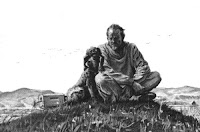
 John Steinbeck's exploration of the U.S.A. in Travels with Charley: In Search of America first came to mind, probably because I just read it for English Seminar. Steinbeck's odyssey is not nearly as exciting as Odysseus' but it is an important journey none the less. Steinbeck sets out in his custom made camper, Rocinante, along with his trusty poodle companion, Charley. The goal of the pan-American trek was to reconnect Steinbeck with America and by the end he felt as though he had succeeded. When Steinbeck visits his home, Montery, California, he has a tense encounter with the bar tender and an old friend of his. Steinbeck is of the same sentiment as Homer: homecomings are dangerous.
John Steinbeck's exploration of the U.S.A. in Travels with Charley: In Search of America first came to mind, probably because I just read it for English Seminar. Steinbeck's odyssey is not nearly as exciting as Odysseus' but it is an important journey none the less. Steinbeck sets out in his custom made camper, Rocinante, along with his trusty poodle companion, Charley. The goal of the pan-American trek was to reconnect Steinbeck with America and by the end he felt as though he had succeeded. When Steinbeck visits his home, Montery, California, he has a tense encounter with the bar tender and an old friend of his. Steinbeck is of the same sentiment as Homer: homecomings are dangerous.

 Steinbeck's journey is fairly dry compared to the Odyssey; Alobar's journey on the other hand is just as exciting and exceedingly magical. Tom Robbins presents Alobar's odyssey through time in Jitterbug Perfume, Alobar's story is one of three intertwined throughout the novel. Alobar like Odysseus is smooth-tongued, sexually-charged and passionately tenacious. Alobar leaves his home in search of the life he is determined to live. Odysseus sought immortality though reputation and Alobar sought immortality of the physical being. Alobar meets his true love, Kudra, in India and together the two discover the secret to immortality all the while with Pan hanging out on the side.
Steinbeck's journey is fairly dry compared to the Odyssey; Alobar's journey on the other hand is just as exciting and exceedingly magical. Tom Robbins presents Alobar's odyssey through time in Jitterbug Perfume, Alobar's story is one of three intertwined throughout the novel. Alobar like Odysseus is smooth-tongued, sexually-charged and passionately tenacious. Alobar leaves his home in search of the life he is determined to live. Odysseus sought immortality though reputation and Alobar sought immortality of the physical being. Alobar meets his true love, Kudra, in India and together the two discover the secret to immortality all the while with Pan hanging out on the side.

 John Steinbeck's exploration of the U.S.A. in Travels with Charley: In Search of America first came to mind, probably because I just read it for English Seminar. Steinbeck's odyssey is not nearly as exciting as Odysseus' but it is an important journey none the less. Steinbeck sets out in his custom made camper, Rocinante, along with his trusty poodle companion, Charley. The goal of the pan-American trek was to reconnect Steinbeck with America and by the end he felt as though he had succeeded. When Steinbeck visits his home, Montery, California, he has a tense encounter with the bar tender and an old friend of his. Steinbeck is of the same sentiment as Homer: homecomings are dangerous.
John Steinbeck's exploration of the U.S.A. in Travels with Charley: In Search of America first came to mind, probably because I just read it for English Seminar. Steinbeck's odyssey is not nearly as exciting as Odysseus' but it is an important journey none the less. Steinbeck sets out in his custom made camper, Rocinante, along with his trusty poodle companion, Charley. The goal of the pan-American trek was to reconnect Steinbeck with America and by the end he felt as though he had succeeded. When Steinbeck visits his home, Montery, California, he has a tense encounter with the bar tender and an old friend of his. Steinbeck is of the same sentiment as Homer: homecomings are dangerous.
 Steinbeck's journey is fairly dry compared to the Odyssey; Alobar's journey on the other hand is just as exciting and exceedingly magical. Tom Robbins presents Alobar's odyssey through time in Jitterbug Perfume, Alobar's story is one of three intertwined throughout the novel. Alobar like Odysseus is smooth-tongued, sexually-charged and passionately tenacious. Alobar leaves his home in search of the life he is determined to live. Odysseus sought immortality though reputation and Alobar sought immortality of the physical being. Alobar meets his true love, Kudra, in India and together the two discover the secret to immortality all the while with Pan hanging out on the side.
Steinbeck's journey is fairly dry compared to the Odyssey; Alobar's journey on the other hand is just as exciting and exceedingly magical. Tom Robbins presents Alobar's odyssey through time in Jitterbug Perfume, Alobar's story is one of three intertwined throughout the novel. Alobar like Odysseus is smooth-tongued, sexually-charged and passionately tenacious. Alobar leaves his home in search of the life he is determined to live. Odysseus sought immortality though reputation and Alobar sought immortality of the physical being. Alobar meets his true love, Kudra, in India and together the two discover the secret to immortality all the while with Pan hanging out on the side.Jack Kerouac's On the Road comes to mind as well. He wrote the entire account of his drunken adventures across the U.S.A. and Mexico with companion Neal Cassady. Kerouac wrote the entire manuscript as a scroll. Like Gilgamesh, Jack Kerouac writes his version of the journey. The characters are closely based on factual individuals.
Of course there are numerous accounts of journeys that have been told in all forms of media. Motorcycle Diaries is another account of an odyssey that led to the rise of one of the most influential political leaders of the 20th century, Che Guevara.
Sunday, January 29, 2012
Odyssey
The Odyssey has to be my favorite read of all time. I love how Odysseus dominates all the obstacles set before him. With his wit and charm he can elude any unfortunate conflict, but he is not one to shy away from battle. His hunger for knowledge has its downsides though. When he wishes to hear the sirens he has his crew strap him to the mast of their ship while they have bees wax in their ears to muffle the melodious sirens' songs. His pride gets the best of him when he reveals his name to Polyphemes.
Thursday, January 26, 2012
"The Lotos-eaters" and photos from the Odyssey
I know Dr. Clemente said he was going to bring in Alfred, Lord Tennyson's poem, "The Lotos-eaters," next week, but here's a preview of it if anyone wants a sneak peek!
The Lotos-eaters by Alfred, Lord Tennyson
And here are various photos of paintings and other artwork of images from the Odyssey.
The Lotos-eaters by Alfred, Lord Tennyson
And here are various photos of paintings and other artwork of images from the Odyssey.
Tuesday, January 24, 2012
Geneology of Greek Mythology
I found this image of the Family Tree of the Greek gods.
Another page with a family tree of the gods is here. It has clickable links with futher information. I HOPE it works, and I hope it is helpful!
Another page with a family tree of the gods is here. It has clickable links with futher information. I HOPE it works, and I hope it is helpful!
Monday, January 23, 2012
The Odyssey on stage!
Even the thesbians have tackeled Odysseus's epic journey. The challenge of multiple locations is a difficult one to meet. The set designs of both Doane and Minnesota State University met the challenge beautifully but with very different approaches. MSU chose simplicity with a series of white tapestries and poles while Doane chose extravagance.
Doane had an elaborate set including sand!




MSU used a shadow to depict the larger-than-life Cyclops too.
Doane had an elaborate set including sand!




MSU used a shadow to depict the larger-than-life Cyclops too.
Oh Brother Where Art Thou?
One of my favorite movies, Oh Brother Where Art Though?, fallowing the story line of The Odyssey. The Cohen brothers put together an American version of the classic tale set during the depression in the South. George Clooney, John Turturro, and Tim Blake Nelson play three escaped prisoners in search for hidden treasure. The various characters and road blocks the trio encounter on their journey parallel those of Odysseus and his men, including the seductive Sirens, one of my favorite scenes from the movie.
Thursday, January 19, 2012
Athena
Athena's an amazing character so far in the Odyssey. I hope there will be more of her to see.
My computer's being mean, so here's a link to the picture of Athena I wanted to post:
http://en.wikipedia.org/wiki/File:Athena_Parthenos_Altemps_Inv8622.jpg
My computer's being mean, so here's a link to the picture of Athena I wanted to post:
http://en.wikipedia.org/wiki/File:Athena_Parthenos_Altemps_Inv8622.jpg
Thursday, January 12, 2012
First Posting World Literature

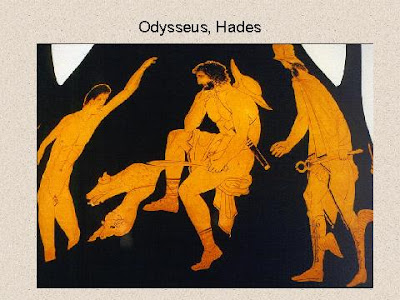

These three images reflect the first three texts we will encounter this term, The Gilgamesh, Homer's Odyssey, and Virgil's Aeneid.
All the members of the World Literature to 1500 will take part in the creation of this
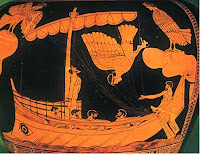 blog to add to the class discussions and knowledge base, using all manner of materials, from hyper links about, say, a graphic novel about Gilgamesh, to video of a new game called Dante's Inferno.
blog to add to the class discussions and knowledge base, using all manner of materials, from hyper links about, say, a graphic novel about Gilgamesh, to video of a new game called Dante's Inferno.The previous two links point to ways in which these ancient epics remain very much part of our contemporary culture, including, of course, a very different Homer's Odyssey:

Subscribe to:
Posts (Atom)





